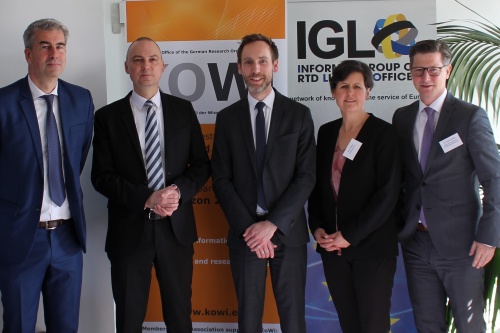"Opportunities of universities of applied sciences in the new research framework program Horizon Europe" was the topic of an event of the network FHnet on 4th and 5th April in Brussels. The network had invited representatives of its member universities to an open exchange – Gert Bikker and Kai Hillebrecht followed the invitation to Brussels on the part of Ostfalia university.
FHnet is a nationwide network of German universities of applied sciences. The FHnet universities want to improve their strategic position with regard to European research topics and increase the visibility of the universities of applied sciences in Europe. The aim is to attract more EU research projects, particularly under the research framework program "Horizon 2020" and the follow-up program "Horizon Europe". The network has been funded by the Federal Ministry of Education and Research (BMBF) since 2017.
The event in Brussels was carried out with assistance of the EU Cooperation Agency of Science Organizations. About 50 participants deepened their knowledge of EU funding opportunities for applied research projects. Speakers from the European Commission, industry and academic associations as well as strategic university networks were present. Together with the representatives of the FHnet member universities they discussed the current state of negotiations on Horizon Europe and possibilities for the participation of universities of applied sciences in Horizon 2020 and the successor program.

Thomas Estermann (European University Association), Jens-Peter Gaul (German Rectors'
Conference), Dr. Henning Gädeke (Permanent Representation of the Federal Republic of Germany to the
EU), Birte Schöpfer (FHnet / Hochschule Bremen), Dr. Ing. Torsten Fischer (EU Cooperation Office of
the Scientific Organizations)
Especially in collaborative research there will continue to be good opportunities for participation in universities of applied sciences.
This is one of the conclusions of the event. For the universities of applied sciences, with their practice-oriented research, this also offers the best prerequisites for an ongoing successful cooperation with the proven partners from the region. The possibility of European funding for innovative start-ups was also discussed during the two-day visit to Brussels, as the universities support the spin-offs of students and employees.